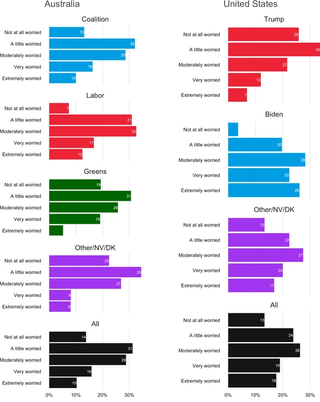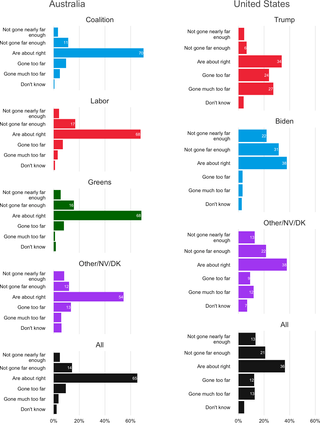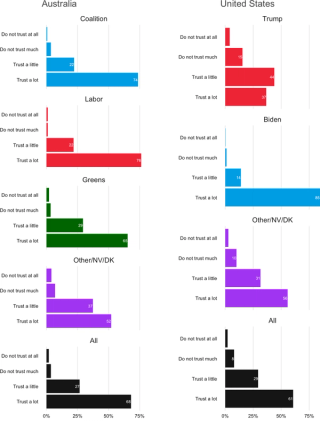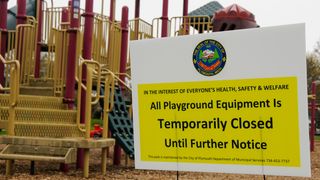While most Australians believe government lockdown measures to tackle the COVID-19 pandemic “are about right”, new public opinion research from the United States Studies Centre finds Americans are deeply divided.
Polling of 2,000 Australians and Americans commissioned by the United States Studies Centre, La Trobe University and the University of Melbourne finds profound partisan disagreements are both symptom and cause of America’s struggles to respond to the pandemic, with US respondents split on concerns about contracting COVID-19, support for lockdowns and trust in medical experts.
Partisan disagreements are both symptom and cause of America’s struggles to respond to the pandemic, with US respondents split on concerns about contracting COVID-19, support for lockdowns and trust in medical experts.
Australians report lower levels of concern about contracting the virus, higher levels of support for lockdowns and trust in medical experts, and almost a complete absence of the partisanship cleaving American public opinion.
Thirty-seven per cent of American respondents were either very or extremely worried they or a family member might contract COVID-19, compared to 26 per cent of Australians. This is understandable, given the much higher incidence of COVID-19 in the United States than in Australia.1
But Democrats and Republicans differ sharply in levels of concern. Just 19 per cent of Republicans are very or extremely worried about contracting the virus, compared to 48 per cent of Democrats. There is no such partisan divide in Australia, with all voting groups reporting the same levels of concern: 26 per cent of Coalition supporters, 29 per cent of Labor voters and 24 per cent of Green voters say they are “extremely” or “very” worried (see Figure 1).
Unlike Americans, Australians are much more supportive of lockdowns, with two-thirds saying that the measures are “about right” with no partisan variation (see Figure 2). Just 36 per cent of Americans say the same, with opinions sharply differing by voting intention. Fifty-one per cent of Trump supporters say lockdowns and social distancing have gone too far, with just six per cent of Biden supporters expressing this view. Fifty-three per cent of Biden supporters and only 11 per cent of Trump supporters say these measures have not gone far enough.
Fifty-one per cent of Trump supporters say lockdowns and social distancing have gone too far, with just six per cent of Biden supporters expressing this view.
Trust in medical expertise appears to be another casualty of profound levels of partisan disagreement in the United States and another marked point of difference with Australia (see Figure 3).
Eighty-five per cent of Biden supporters say they trust medical experts “a lot” with respect to the pandemic. Only 37 per cent of Trump supporters say the same. This leaves overall US levels of trust in medical experts at 61 per cent — only a little lower than the 68 per cent Australian overall level. Importantly, there is no difference between Coalition and Labor supporters (74 per cent and 76 per cent), with lower levels of trust in medical experts reported by Greens (65 per cent) and supporters of other parties (52 per cent).
These deep partisan divisions are arguably both a symptom and cause of America’s struggle to contain the COVID-19 pandemic, while Australian public opinion and Australia’s relative success in responding to the pandemic is almost a mirror image of the lack of consensus around COVID-19 in the United States.
Bipartisanship, reliance on scientific expertise, effective policies and public support for those policies form a virtuous circle. The public is much more willing to support tough policies when political leaders from opposite sides of politics are seen to be united and relying on experts, as we’ve seen in Australia with the National Cabinet. In these circumstances, opposition to policies is outside the mainstream and is starved of political oxygen.
Partisan acrimony in the United States was running at century-high levels prior to the COVID-19 crisis. With elections in November, and after the Trump administration’s slow response to the crisis in its opening months, prospects of an effective, bipartisan policy in the United States completely evaporated.
Figure 1. Are you extremely worried, very worried, moderately worried, a little worried or not at all worried about the possibility you or a family member might catch the coronavirus?

Americans are more concerned about possibly contracting COVID-19 than Australians. Partisanship again divides Americans, with 48 per cent of Biden supporters “very” or “extremely worried” about contracting the virus, compared to just 19 per cent of Trump supporters; corresponding Australian figures are 26 per cent of Coalition voters, 29 per cent Labor and 24 per cent Greens.
Figure 2. Would you say the restrictions in movement and gatherings in public designed to reduce the spread of the coronavirus strain known as COVID-19 have gone too far, are about right, or have not gone far enough?

Partisanship drives American attitudes towards lockdowns, but not at all among Australian respondents. Consequently, Americans are more likely than Australians to say that lockdowns have both “gone too far” and “not far enough” while Australians are more likely to say they are about right.
Figure 3. When accessing information about the coronavirus, how much do you generally trust medical experts?

Australians are slightly more likely than Americans to trust medical experts than are Americans. Eighty-five per cent of Biden supporters say they trust medical experts “a lot”, compared to just 37 per cent of Trump supporters; corresponding percentages in Australia are 74 per cent for Coalition supporters, 76 per cent Labor and 65 per cent Greens.
About the surveys
Almost identically worded surveys were administered to Australian and American respondents on the weekend of 2-3 May 2020. The surveys were fielded by YouGov, a leading international survey and market research company, randomly selecting respondents from panels of Australians and Americans who have previously agreed to take surveys.
Sample sizes were 1,050 in the United States and 1,005 in Australia. Both the US and Australian data were weighted to be representative of each country’s population. Australian data were weighted by age, gender and region. US data were weighted by age, race, gender and education.
After weighting, the maximum margin of error is plus/minus 3.3 percentage points for the US survey and plus/minus 3.2 percentage points for the Australian survey. These maximum margins of error are larger when analysing sub-groups within each country.
Voting intention questions differ across the two countries. American respondents who said they were registered to vote were asked: “If the election for president were being held today, for whom would you vote?” Australian respondents who said they were eligible to vote were asked: “If a federal election was held this Saturday, which of these parties would you give your first preference vote in the House of Representatives?”









